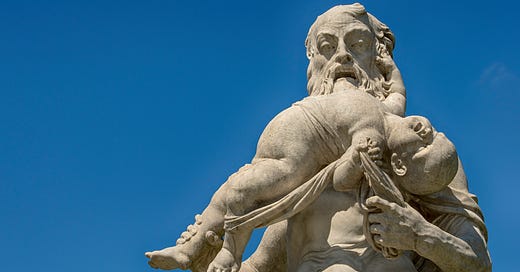Fresh Batch #174: Pattern of the Pater
Petah, Baal, Kronos, Saturn, the Sun, Ob, Op
The AI narrator for the Substack app has improved tremendously. For those of you who don’t like to read, simply click this article in the app and hit the play button. A realistic voice will narrate it for you. Shoutout to my boy Chance Garton, who came up with the witty pattern of the Pater. This will be a great example of the paternal system, stemming from God the First Father, or Iu-Primus-Ater, which was truncated to Iu-Pater, which we now spell Jupiter.
Petah
Jacob Bryant wrote (Anal. Ant. Myth. pp. 43, 44.), “Of this Amonian term of honour I have taken notice in a treatise before. I have shown, that it was to be found in many Egyptian names, such as Petiphra, Petiphera, Petisonius, Petosiris, Petubastus the Tanite, and Petesuccus builder of the Labyrinth. (See Observations and Inquiries. p. 163.) Petes, called Peteos in Homer, the father of Menetheos the Athenian, is of the same original: Τον γαρ Πετην, τον πατερα Μενεθεως, του στρατευσαντος εις Τροιαν, φανερως Αιγυπτιον ύπαρξαντα κτλ. (It also says that Menetheos was apparently Egyptian. Mene-Theos is God Manu/Menu. Diodorus Siculus. L. 1. p. 25.) All the great officers of the Babylonians and Persians took their names from some sacred title of the Sun. Herodotus mentions (L. 3. c. 61.) Petazithes Magus, and Patriamphes (L. 7. c. 40.): the latter was charioteer to Xerxes in his expedition to Greece: but he was denominated from another office; for he was brother to Smerdis, and a Magus; which was a priest of the Sun. This term is sometimes subjoined, as in Atropatia, a province in Media (Also in Asampatæ, a nation upon the Mæotis. Plin. L. 6. c. 7.); which was so named, as we learn from Strabo, απο του Ατροπατου ήγεμονος. (From the Atropatos Hegemon (ruler). L. 11. p. 794. He speaks of it as a proper name; but it was certainly a title and term of office.) In the accounts of the Amazons likewise this word occurs. They are said to have been called Aorpata, or according to the common reading in Herodotus, Oiorpata; which writer places them upon the Cimmerian Bosporus. Τας δε Αμαζονας καλεουσι Σκυθαι Οιορπατα δυναται δε το ουνομα τουτο κατ’ Έλλαδα γλωσσαν ανδροκτονοι Οιορ γαρ καλεουσι τον ανδρα, το δε πατα κτεινειν. (Herodotus. L. 4. c. 110.)
“This etymology is founded upon a notion that the Amazons were a community of women, who killed every man, with whom they had any commerce, and yet subsisted as a people for ages. I shall hereafter speak of the nations under this title; for there were more than one: but all of one family; all colonies from Egypt. The title was given them from their worship: for Oiorpata, or, as some manuscripts have it, Aor-pata, is the same as Petah Or, the priest of Orus; or in a more lax sense, the votaries of God. They were Ανδροκτονοι (cannibals); for they sacrificed all strangers, whom fortune brought upon their coast: so that the whole Euxine sea, upon which they lived, was rendered infamous from their cruelty: but they did not take their name from this circumstance.”
Recall that Cimmerian means perpetual darkness. Euxine pertains to the Black Sea. Is there perpetual darkness in the geographic Black Sea, or might the name Black Sea be taken from these allegories and assigned to the current geographical region, long after these stories were written? Furthermore, Euxine means hospitable. So is the region hospitable, or is it in perpetual darkness and filled with mythical women who sacrifice all wayfarers, yet somehow still propagate their species? Or are we dealing with astrotheology? Also notice Bryant refers to Petah Or as priests of the Sun, Orus. However, he doesn’t not remind the reader that this was also the similar name for the priests of Apollo, who were called Pateres, meaning Fathers, which is why Christian priests are called fathers.
Bryant continued (Ib. p. 45.), “One of the Egyptian Deities was named Neith, and Neit; and analogous to the above her priests were styled Pataneit. (Proclus in Timæum. L. 1. p. 31. See Iablonsky. L. 1. c. 3. p. 57. Clemens Alexand. Strom. L. 1. p. 356.) They were also named Sonchin, which signifies a priest of the Sun: for Son, San, Zan, are some of the same signification; and Son-Chin is Ζανος ίερευς (Zanos Hiereus). Proclus says, that it was the title of the priests; and particularly of him, who presided in the college of Neith at Saïs.”
Bel and Baal
Bryant wrote (Ib. pp. 45, 46.), “Bel, Bal, Baal, is a Babylonish title, appropriated to the Sun; and made use of by the Amonians in other countries; particularly in Syria and Canaan. It signified Κυριος, or Lord, and is often found compounded with other terms; as in Bel-Adon, Belorus, Bal-hamon, Belochus, Bel-on; (from which last came Bellona of the Romans) and also Baal-shamaim, the great Lord of the Heavens. This was a title given by the Syrians to the Sun: Τον Ήλιον Βεελσαμην χαλουσιν, ό εστι παρα Φοινεξι Κυριος Ουρανου, Ζευς δε παρ’ Έλλησι. The Sun is called Veelsamin (Baal-shamaim), akin to the Phoenician Lord Ouranos, or Zeus of the Greeks. (Eusebius. Præp. Evang. L. 1. c. 10. p. 34.) We may from hence decipher the name of the Sun, as mentioned before by Damascius, who stiles that Deity Bolathes: Φοινικες και Συροι τον Κρονον Ηλ, και Βηλ, και Βολαθην επονομαζουσι. The Phoenicians and Syrians call Kronos El, and Bel (or Vel) and Bolathen (or Volathin). (Damascius apud Photium. c. 243. Belus primus Rex Assyriorum, quos constat Saturnum (quem eundem et Solem dicunt) Junonemque coluisse. Belus was the first King of the Assyrians, who are said to have worshipped Saturn (whom they say is the same as the Sun) and Juno. Servius in Virg. Æneid. L. 1.) What he terms Bolathes is a compound of Bal-Ath, or Bal-Athis; the same as Atis, and Atish of Lydia, Persis, and other countries. Philo Biblius interprets it Zeus: Damascius supposed it to mean Cronus; as did likewise Theophilus: Ενιοι μεν σεβονται τον Κρονον, και τουτον αυτον ονομαζουσι Βηλ, και Βαλ, μαλιστα όι οικουντες τα ανατολικα κλιματα. Some pay homage to Kronos, and he is called Bel and Bal by those in the Orient. (Theoph. ad Antolycum. L. 3. p. 399. Μη γινωσκοντες, μητε τις εστιν ό Κρονος, μητε τις εστιν ό Βηλος. It is uncertain if Kronos is Belos? Not sure how to translate this one. Idem.) This diversity amounts to little: for I shall hereafter show, that all the Grecian names of Deities, however appropriated, were originally titles of one God, and related to the Sun.”
You will recall that Assyria, in Hebrew, is spelled ASUR, the same as the Elder Futhark spelling of the Gods (Aesir). The first king of the Assyrians being Belus is actually an astrotheological encode of the first King of the Gods, or the luminaries, in the land of the Gods (ASUR), or heaven, being the sun.
This is my first time examining Jacob Bryant’s work in full, but I am sure I’ve come across other learned men citing him to support their research. This is why I call the system Sunscript. It is the basis of all priestcraft, at least in Europe, North Africa, and Asia Minor. It’s fingerprints are seen in Sanskrit, which used to be written as Sanscrit, and given that San is Sun, as well as Sacred and Holy, we see that Sanskrit also is the Holy or Sacred Script of the Sun.
To learn the more intricate details of this system, read the entire Spirit Whirled series, and then dive into The Real Universal Empire to see the historical and chronological implications of it on European/Mediterranean history. This majority of research in this Substack is written for those who’ve done that so I don’t have to be too repetitive.







Become a member to access the rest of this article.
Keep reading with a 7-day free trial
Subscribe to Ancient History, Mythology, & Epic Fantasy to keep reading this post and get 7 days of free access to the full post archives.





